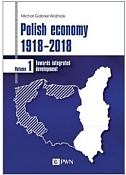|
||
Strona główna > opis książki
• wydawnictwa polskie
• Zamów informacje o nowościach z wybranego tematu • kontakt
• Cookies na stronie |
POLISH ECONOMY 1918-2018 TOWARDS INTEGRATED DEVELOPMENT VOLUME 1WOŹNIAK M.G.wydawnictwo: PWN , rok wydania 2020, wydanie Icena netto: Polish economy 1918-2018 Towards integrated development Volume 1 History is a source of red flags. However, one must learn to read them and distinguish what is barely temporary in its nature from what can lasts for centuries. System reforms that support the efficiency of these systems cannot be carried out without the knowledge that institutions form a structure with a diversified horizon of action, and their modernization is possible, but the operation of new institutions decreed by reforms is conditioned, among others, by attachment of the rules of thinking and action to the historical trail. Without reliable historical knowledge, scholars' prescriptions easily become wishes, and reforms referring to them sooner or later turn to be disappointing. The works of Professor Michał G. Woźniak always bring something new to our economic knowledge. It is no different this time. This ambitious work describes and explains the turbulent course of economic processes in Poland in the years 1918-2018. It is always easier to write about the first decades of the last century, since we are separated from them by a considerable historical distance than about the last decades, which we have witnessed and participated in. After all, the author accurately shows which links were not strong enough to make it a process of integrated development, which is still only an idea and theoretical concept that is so precious not only to him. prof. Grzegorz W. Kołodko, Kozminski University (Akademia Leona Koźmińskiego), the four-time deputy prime minister and minister of finance of the Republic of Poland in 1994-1997 and 2002-2003 The 100th anniversary of Poland regaining independence, gives the author an occasion to refer to history so as to show that we can draw instructions and inspirations that may be useful to us in today's reality. He states, rightly, that we should apply a holistic approach that will allow us to analyse the interconnections of the economic sphere with other areas of "human existence and action". (...) The book stands for a historical overview of economic policies implemented in Poland. It contains many very accurate insights that allow you to better understand today's economic reality. The publication is an important voice in the on-going discussion in Poland, on how to set the development direction to the economy and how to do it so that the implemented policy leads to the development of an integrated, innovative economy and modernized human capital. The book should be of interest to economists and sociologists – and, perhaps above all, to politicians. Prof. Jerzy Żyżyński, an economist associated with the University of Warsaw, member of the Monetary Policy Council (Rada Polityki Pieniężnej, (RPP) Introduction CHAPTER 1. From liberałism to interventionism (1918-1939) 1.1. Post-partition challenges and the Polish economy 1.2. From inflation to stabilised development 1.3. The shock of the Great Crisis 1.4. Belated economic interventionism 1.5. Conclusions CHAPTER 2. The communist experiment (1945-1989) 2.1. Instead of an introduction 2.2. Socialist industrialisation 2.3. An attempt to harmonise the development and to reform the system 2.4. After the martial law, or market socialism without the market and self-government 2.5. Conclusions, or the roots of the concept of transition to capitalism CHAPTER 3. Winding paths to build a market economy (1990-2018) 3.1. Transformational shock and postponed active adaptations 3.2. The first attempt to integrate development processes - "Strategy for Poland" 3.3. Towards public sector reforms and supply adjustments 3.4. Has the local government reform broken the monopoly of uniform state authority? 3.5. Deregulation of the labour market 3.6. Controversial recipes for reforms of formal education and science development 3.7. Attempts to overcome disintegration of the health care system 3.8. Unfortunate liberalisation of the pension system 3.9. Effects of implementing the EU socio-economic coherence pattern and continuing diffusion-polarisation development (2004-2015) 3.10. Responsible development (2016-?) CHAPTER 4. Lessons to be leamt for the future, or why integrated development and modemisation of human capital are desirable List of Tables List of Figures References Item index 216 pages, Paperback Księgarnia nie działa. Nie odpowiadamy na pytania i nie realizujemy zamówien. Do odwolania !. |


